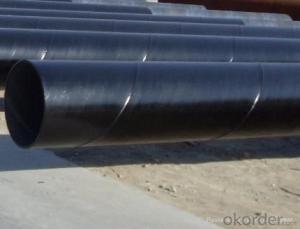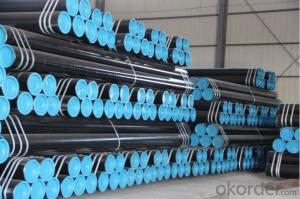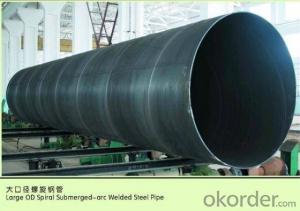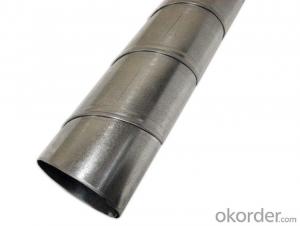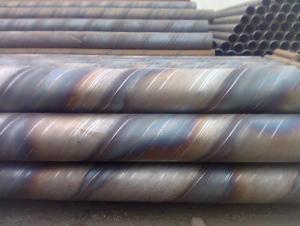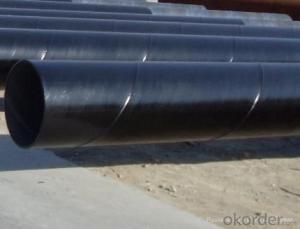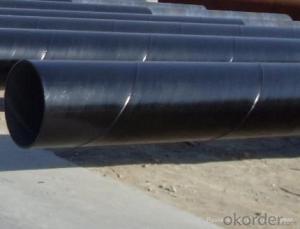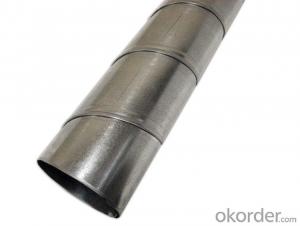SPIRAL STEEL PIPE14‘ 16’‘ 18’‘ 20’‘ 24’’LARGE DIAMETER PIPE
- Loading Port:
- Tianjin
- Payment Terms:
- TT OR LC
- Min Order Qty:
- 5 m.t.
- Supply Capability:
- 3000 m.t./month
OKorder Service Pledge
OKorder Financial Service
You Might Also Like
Packaging & Delivery
Packaging Detail: | standard export packing or as customer's requirement |
Delivery Detail: | within 10 - 30 days |
Specifications
Spiral Welded Steel Pipes and Tubes
1.Material:Q195-Q235
2.Length:1-12m
3.WT:1.0-14mm
4.O.D.:20-273mm
Spiral Welded Steel Pipes and Tubes
Product Description:
1.Material : Q235,Q345,L245,L290,L360,L415,L450,L485,GrB,X42,46,X52,X56,X60,X65,X70,X80,X100
2,Standard: SY/T5037-2000,GB/T9711-2011,API Spec 5L PSL1/PSL2,ASTM A252\A53,ISO3183,DIN17172,EN10217,JIS G3457,AWWA C200,ASTM A139,ASTM A671,ASTM A672
3.Wall thickness: 3.0mm-30mm
4.Outer diameter: φ168mm-3020mm
5,Length: 5m-12m or as your requirement
6,Corrosion protection standard: DIN30670,DIN30671, AWWAC210, AWWA C203, SY/T0413-2002,SY/T0414-2002
7,Application: Oil, gas, natural gas, water pipe, thermal electricity pipe, steel structure engineering, etc
Q195-q345 Material Steel Pipe's Materials
Elements | Chemical Compsition% | Mechanical Property | ||||||
C% | Mn% | S% | P% | Si% | Yield Point (Mpa) | Tensile Strength(Mpa) | Elongation | |
Q195 | 0.06-0.12 | 0.25-0.50 | <0.050< span=""> | <0.045< span=""> | <0.030< span=""> | >195 | 315-430 | 32-33 |
Q215 | 0.09-0.15 | 0.25-0.55 | <0.05< span=""> | <0.045< span=""> | <0.030< span=""> | >215 | 335-450 | 26-31 |
Q235 | 0.12-0.20 | 0.30-0.70 | <0.045< span=""> | <0.045< span=""> | <0.030< span=""> | >235 | 375-500 | 24-26 |
Q345 | <0.20< span=""> | 1.0-1.6 | <0.040< span=""> | <0.040< span=""> | <0.55< span=""> | >345 | 470-630 | 21-22 |
- Q: What are the common applications of steel pipes in the water distribution system?
- Steel pipes are commonly used in water distribution systems for various applications such as transporting water from treatment plants to homes, buildings, and industries, as well as for underground water mains and fire hydrant systems.
- Q: How do steel pipes compare to other materials in terms of cost?
- Steel pipes are generally more cost-effective than many other materials used for pipes, thanks to their durability, strength, and availability. While initial costs may vary depending on factors like size and grade, steel pipes offer a longer lifespan and require less maintenance compared to other materials, making them a cost-efficient choice in the long run.
- Q: Can steel pipes be used for wastewater disposal?
- Yes, steel pipes can be used for wastewater disposal. Steel is a durable and corrosion-resistant material, making it suitable for transporting and disposing of wastewater safely and efficiently.
- Q: What are the different methods of pipe bending for steel pipes?
- Some of the common methods of pipe bending for steel pipes include rotary draw bending, induction bending, and hot bending.
- Q: What is the difference between ERW and SAW steel pipes?
- ERW (Electric Resistance Welded) steel pipes are manufactured by rolling metal sheets and then welding the seams using high-frequency electrical currents. SAW (Submerged Arc Welded) steel pipes, on the other hand, are formed by welding the seams using a submerged arc welding process. The main difference between the two lies in the welding method and the resulting quality of the weld. ERW pipes tend to have a smoother and more consistent weld, while SAW pipes have a slightly rougher weld due to the submerged arc process. Additionally, SAW pipes are generally used for larger diameters and thicker walls, while ERW pipes are commonly used for smaller diameters and thinner walls.
- Q: How are steel pipes used in data centers?
- Steel pipes are commonly used in data centers for various purposes such as routing cables, running water cooling systems, and providing structural support for equipment. They are used to create a robust and organized network infrastructure, ensuring efficient and reliable data transmission and management within the facility.
- Q: How are steel pipes protected against ultraviolet (UV) radiation?
- Steel pipes are typically protected against ultraviolet (UV) radiation through the application of specialized coatings or paints that act as a barrier, preventing direct exposure of the steel to UV rays. These coatings are designed to withstand UV degradation, prevent corrosion, and extend the lifespan of the pipes.
- Q: Can steel pipes be used for hydraulic systems?
- Yes, steel pipes can be used for hydraulic systems. Steel pipes are commonly used in hydraulic systems due to their high strength, durability, and resistance to high pressure and temperature. They provide reliable performance and are suitable for a wide range of hydraulic applications.
- Q: How are steel pipes protected against corrosion?
- Steel pipes are protected against corrosion through various methods such as applying protective coatings, galvanizing, cathodic protection, and using corrosion inhibitors.
- Q: What is the thickness of steel pipes?
- The thickness of steel pipes can vary depending on the specific application and industry requirements. However, typical steel pipes used in various industries, such as construction and oil and gas, can have thicknesses ranging from a few millimeters to several centimeters.
Send your message to us
SPIRAL STEEL PIPE14‘ 16’‘ 18’‘ 20’‘ 24’’LARGE DIAMETER PIPE
- Loading Port:
- Tianjin
- Payment Terms:
- TT OR LC
- Min Order Qty:
- 5 m.t.
- Supply Capability:
- 3000 m.t./month
OKorder Service Pledge
OKorder Financial Service
Similar products
Hot products
Hot Searches
Related keywords
